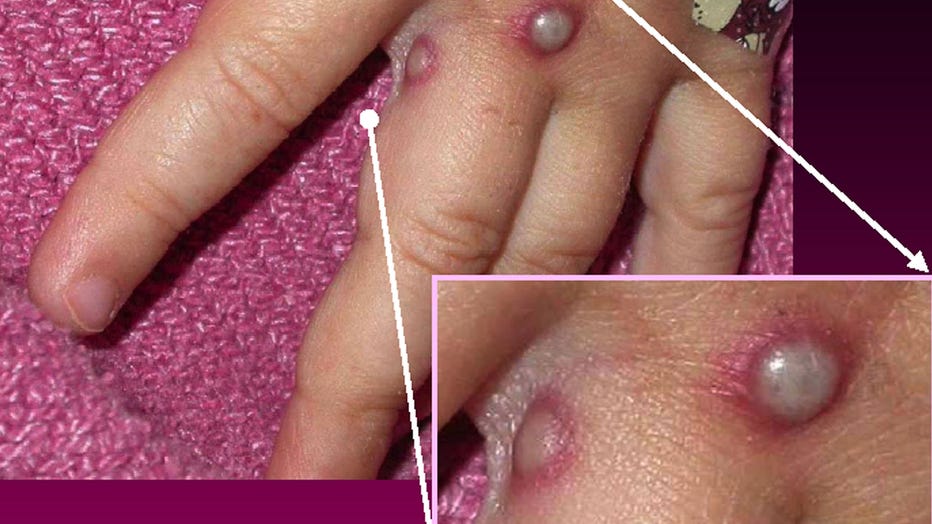Washington health officials investigate presumptive case of monkeypox
SEATTLE - Washington health officials said Monday they were investigating a presumptive case of monkeypox in the state. It's one of less than ten confirmed or suspected monkeypox cases in the U.S.
Few details were immediately known, but the presumptive case of monkeypox virus was reported to Public Health Seattle & King County on Sunday.
Health Officer Dr. Jeff Duchin said the person is an adult man who traveled in the last month to a country that has had recent cases of monkeypox. That person was not hospitalized and is isolating at home.
"The public and healthcare providers should be aware of the growing international monkeypox outbreak," said Dr. Jeff Duchin, Health Officer for Public Health – Seattle & King County. "At this time, we have no evidence that monkeypox is spreading locally, but if there are unrecognized cases, that is a possibility."
Initial testing at the Washington State Public Health Laboratory confirmed orthopoxviral infection. The Centers for Disease Control & Prevention (CDC) will also confirm the test results.
Duchin said health officials have not identified any high-risk exposures.
"We at DOH continue to work with Public Health – Seattle & King County and CDC to support the investigation of this case. The risk to the public is low, but it's important for clinicians and the public to be aware of the symptoms and risk factors for monkeypox," said Dr. Tao Kwan-Gett, Washington State Chief Science Officer.
In addition to this case, the CDC has identified one confirmed and four other suspected cases of monkeypox in the US.
What is monkeypox?

Scientists who have monitored numerous outbreaks of monkeypox in Africa say they are baffled by the disease's recent spread in Europe and North America.
Cases of the smallpox-related disease have previously been seen only among people with links to central and West Africa. But in the past week, Britain, Spain, Portugal, Italy, U.S., Sweden and Canada all reported infections, mostly in young men who hadn’t previously traveled to Africa.
France, Germany, Belgium and Australia confirmed their first cases of monkeypox on Friday.
"I’m stunned by this. Every day I wake up and there are more countries infected," said Oyewale Tomori, a virologist who formerly headed the Nigerian Academy of Science and who sits on several World Health Organization advisory boards.
"This is not the kind of spread we’ve seen in West Africa, so there may be something new happening in the West," he said.
Monkeypox typically causes fever, chills, a rash and lesions on the face or genitals. WHO estimates the disease is fatal for up to one in 10 people, but smallpox vaccines are protective and some antiviral drugs are also being developed.
One of the theories British health officials are exploring is whether the disease is being sexually transmitted. Health officials have asked doctors and nurses to be on alert for potential cases, but said the risk to the general population is low.
Nigeria reports about 3,000 monkeypox cases a year, WHO said. Outbreaks are usually in rural areas, where people have close contact with infected rats and squirrels,said Tomori, a virologist who formerly headed the Nigerian Academy of Science and who sits on several World Health Organization advisory boards. He said many cases are likely missed.
RELATED: Monkeypox: What you should know as the disease spreads around the world
Tomori hoped the appearance of monkeypox cases across Europe and other countries would further scientific understanding of the disease.
The WHO's lead on emergency response, Dr. Ibrahima Soce Fall, acknowledged this week that there were still "so many unknowns in terms of the dynamics of transmission, the clinical features (and) the epidemiology."
On Friday, Britain's Health Security Agency reported 11 new monkeypox cases, saying that "a notable proportion" of the most recent infections in the U.K. and Europe have been in young men with no history of travel to Africa who were gay, bisexual or had sex with men.
Authorities in Spain and Portugal also said their cases were in young men who mostly had sex with other men and said those cases were picked up when the men turned up with lesions at sexual health clinics.
Experts have stressed they do not know if the disease is being spread through sex or other close contact related to sex.
Nigeria hasn't seen sexual transmission, Tomori said, but he noted that viruses that hadn’t initially been known to transmit via sex, like Ebola, were later proven to do so after bigger epidemics showed different patterns of spread.
The same could be true of monkeypox, Tomori said.

Monkeypox lesions (Photo Courtesy of CDC/Getty Images)
In Germany, Health Minister Karl Lauterbach said the government was confident the outbreak could be contained. He said the virus was being sequenced to see if there were any genetic changes that might have made it more infectious.
Rolf Gustafson, an infectious diseases professor, told Swedish broadcaster SVT that it was "very difficult" to imagine the situation might worsen.
"We will certainly find some further cases in Sweden, but I do not think there will be an epidemic in any way," Gustafson said. "There is nothing to suggest that at present."
RELATED: Biden on Monkeypox: Outbreak should concern 'everybody,' as health experts are baffled
Scientists said that while it's possible the outbreak's first patient caught the disease while in Africa, what's happening now is exceptional.
"We've never seen anything like what's happening in Europe," said Christian Happi, director of the African Centre of Excellence for Genomics of Infectious Diseases. "We haven't seen anything to say that the transmission patterns of monkeypox have been changing in Africa. So if something different is happening in Europe, then Europe needs to investigate that."
The Associated Press contributed to this report.

